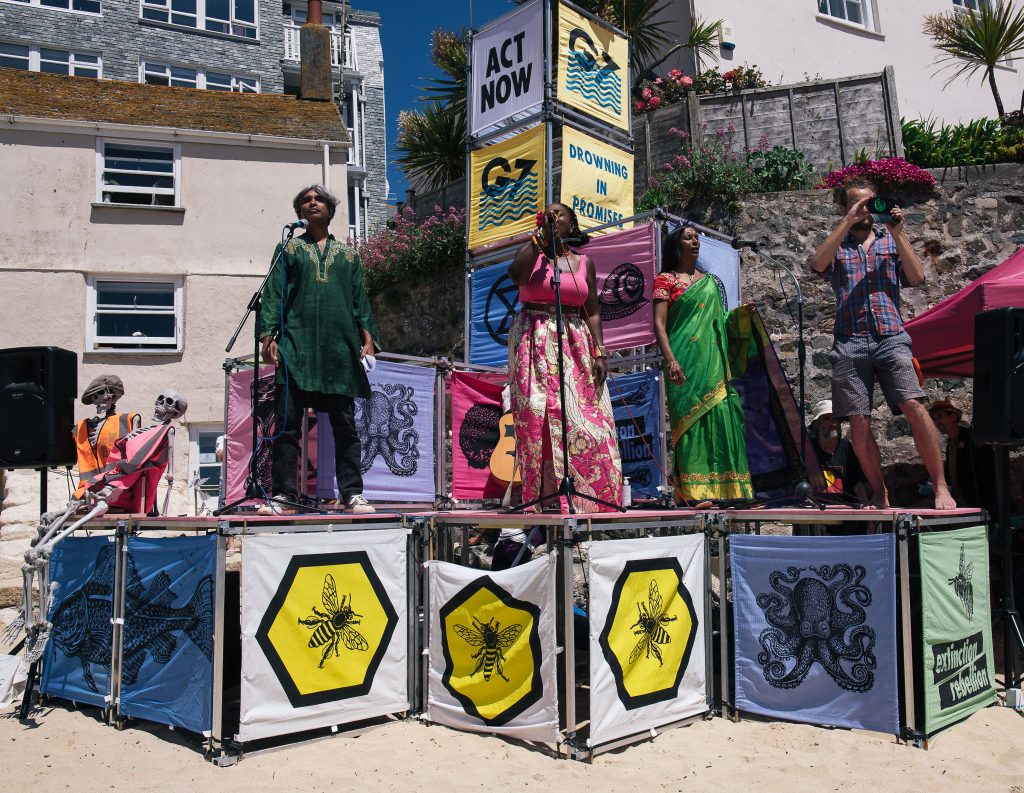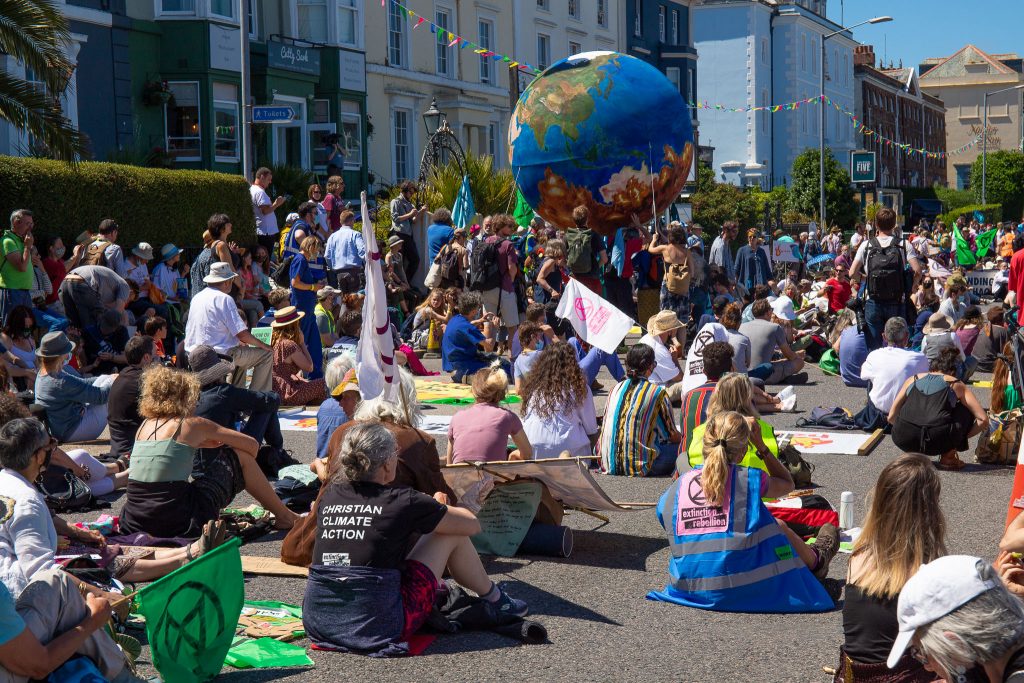by Kaspa Thompson

It was Sunday lunchtime. The heat was blazing. I was sitting with half a dozen XR Buddhists in meditation on Smeatons Pier.
Down on the beach below Rob Hopkins (author of ‘From What is to What if’) was giving a talk about imagination and longing. There was a crowd of rebels listening attentively. XR flags occasionally lifted up and flapped in the light breeze.
I was travelling light and hadn’t bought a meditation cushion or bench. For a while I simply sat cross legged on the hard concrete. Then my back started to ache. I tried taking off my shoes and using them as a cushion. That didn’t help my back at all and my bare feet pressed up against the rough surface of the pier. Then I thought ‘Is my head burning?’, glancing down at the time on my phone and wondering how far through the meditation time we were.
Despite all of this physical discomfort, this was one of the most peaceful and settled experiences throughout my weekend. Despite how few people were looking up at this row of XR Buddhists, or walking by us on the pier, for me this was one of the most significant actions.
There was something very powerful about finding some of what Suzuki Roshi called Big Mind in the middle of, on the one hand, a noisy crowded weekend of protests, and on the other a keen awareness of the suffering that the climate crisis has caused and will continue to cause.
That weekend I had witnessed the prayers and intention setting of the opening ceremony, marched with a thousand others through the streets of St. Ives, waved off the march through Falmouth and spent a decent chunk of time wandering around in the heat with a group of rebels looking for the best place to stage a theatrical action that didn’t happen. I sang with the song-holders, chatted with other rebels and kept an eye on social media and the news for photos and stories of all the actions that I missed, from Ocean Rebellion’s dawn mermaid action to Surfers Against Sewage’s paddle out for the planet. I found time for hanging out with friends on the beach, for sitting in the park with the dogs, and for more than one ice-cream. I watched Satya cover herself with a sheet and become a corpse for the XR Doctors’ action.

I spent the following week at home noticing guilt, shame and powerlessness washing around inside me. Had any of this made any difference, I wondered? Had I done as much as others? It’s easy for me to feel responsible for the whole of the climate crisis. Of course that’s not true, but I wonder what purpose that belief serves?
I have heard a distinction made between useful suffering and useless suffering. Useful suffering is the unavoidable suffering that is grist to the mill for practice and leads to fellow-feeling and compassion. This is birth, sickness, old-age, death etc. Useless suffering is the creation of a mind trying to avoid ‘useful’ suffering. It is unhelpful beliefs about ourselves and the world: this shouldn’t happen to me; I’m this sort of person, or that sort of person; or – like me in Cornwall – it’s my job to fix it all.
It is helpful to think of two kinds of suffering, but in my experience both types of suffering (suffering in the world and in our minds) are inevitable and both, if approached in the right way, can be a pointer towards love. We all suffer with birth, sickness etc. and we all create belief systems that don’t serve us.
If we can notice this in a loving way, with some kindness and spaciousness, we discover something about the human condition. Feeling tender towards our body/mind and their troubles, we begin to feel tender towards the body/mind of others.
This kind of attention brings wisdom. When I get curious about this habit of taking responsibility for all, I discover a couple of things. This habit has good intentions but mistaken beliefs: if I do a good job of being the responsible one I won’t get into trouble. Maybe that was true at one time, but it isn’t true now. I also discover that it keeps me away from paying closer attention to the real harm that I cause (through my carbon footprint etc.). In this role this habit again has good intentions but a mistaken belief: I’ll keep Kaspa safe by keeping him away from these truths, otherwise he will be overwhelmed by shame and guilt. Ironically it serves this purpose by using one dose of shame and guilt to avoid a different one.
As I maintain a loving attitude through this investigation, the habits reveal these truths to me, and they begin to relax and let go. In the light of loving kindness and wisdom the delusion begins to dissolve.
As these habits loosen their grip, really useful questions appear: are there ways in which my actions cause harm? Are there things I can change in response to seeing that? And where is the best place to put my energy, being the kind of person I am, in the crisis we are all facing?
The weekend following the Cornwall actions I co-led a mindful walk on the hills and took part in two XR Buddhist events: a debrief for the G7 actions and a mantra chanting session. Through spending time in those spaces I was reminded again that it is Buddhist practice alongside activism that is the most meaningful to me, and the place where I can best make a contribution.
I am reminded again of that moment on the pier, when I experienced a deep sense of peace and a knowing both that this was a significant action and that regardless of the impact there is always something to take refuge in: Buddha, the Pure Land, Nirvana, emptiness. The love and wisdom we find there is unconditional: we are welcome there, and it does not depend on anything in the world for its existence.
In actions like this I am given a glimpse of the completion of the Bodhisattva vow (to save all beings) and of the Bodhichitta (the heart of awakening). Often we think of activism and practice as separate: we act, and then we return to practice to digest the action, and then we act again and then we return to practice and so on.
When our hearts are awakened we naturally make an appropriate response to whatever we find. In the Buddha wisdom, compassion and action arise spontaneously, together and without selfish calculation. Usually our activism and our Buddhist practice support one another. Ultimately they become the same thing.
Often the form of XR Buddhists’ actions reflect this understanding, as we meditate in the road, or in a bank, or whilst winding our way through a busy protest in walking meditation.
Recalling that useful question: where is the best place to put my energy? I find the answer here. I am called to create the conditions for this kind of activism and for this kind of practice: where a deep care for the earth and Buddhist practice and taking action come together.
As to the effectiveness of our actions? On the one hand we are encouraged to let go of results, and I bring to mind how profound and meaningful these actions are in the moment of acting and trust that that is enough, and on the other hand I look back over the past three years since the foundation of Extinction Rebellion and see how far the national conversation on the climate crisis has moved and I am given some hope.
Kaspa Thompson is currently co-coordinator of XR Buddhists. He is a Buddhist teacher at Bright Earth Buddhist Temple, and a psychotherapist.

Pingback: Engaged Buddhist Writing – Bright Earth